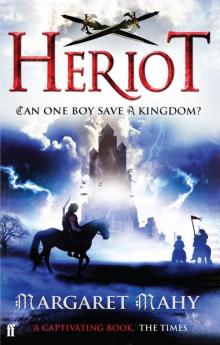- Home
- Margaret Mahy
Kaitangata Twitch Page 7
Kaitangata Twitch Read online
Page 7
He passed the cup of hot chocolate to Meredith, who took it eagerly.
‘After the meeting tonight, I was a bit wound up. I couldn’t just go to sleep,’ he went on, ‘so I stayed up to do a bit of reading. And then I went for a walk. That was how I came to see you, thank goodness.’
The book he had been reading was on the table. Meredith twisted her head sideways to read the title: Place Names of the Greater Bay Area.
‘Does it mention Kaitangata in there?’ she asked, picking up the book and turning the pages curiously.
Her father paused.
‘Well, yes,’ he said, sounding rather reluctant for some reason. ‘Kai is the Maori word for food, of course, and tangata means people.’
‘Food–people! People–food!’ said Meredith aloud. ‘Oh yes. Lee said the Ngai Tahu had killed people there – and eaten them.’
Just for a moment she had a picture in her head of blood soaking into the sand . . . soaking into the sand . . . and the island somehow lapping it up.
‘Lee’s a storyteller, not a historian,’ said Mr Gallagher dismissively. ‘I suppose they may have, a long, long time ago. Or it might refer to a single incident. He doesn’t know the difference.’
‘Everything gets hungry,’ said Meredith (Flick! ‘Feed!’ demanded something in her head) ‘and nothing that gets eaten wants to be eaten.’ A lot of old stories ran, fast-forward, through her head – ‘The Three Billy Goats Gruff ’, ‘The Three Little Pigs’ and ‘The Wolf and the Seven Little Kids’. The excitement of nursery tales was all about who managed to eat who. ‘Chickens, lambs, fish, none of them want to be eaten.’
‘How true,’ her father said, smiling at her, but still sounding as if he felt uneasy – far more uneasy than Meredith herself was feeling. ‘And with that gruesome thought – what about bed? I’ll sit with you if you like . . . sing a song or two the way I used to do when you were little.’
‘I’ve just come back from a cannibal isle,
Called Hi-tiddly-hi-ti Isle,’
Meredith sang, teasing him a little.
‘Not that song!’ he said sternly. ‘I don’t want you having any more nightmares.’ But Meredith knew she was dreamed out.
‘Brush your teeth after that chocolate,’ he reminded her like a good father. Meredith brushed her teeth like a good girl.
Bending over the handbasin, sniffing the healthy, homely toothpaste smell, feeling the toothbrush push her cheek out sideways as she brushed her back teeth, she let her recent nightmare seep cautiously back into her memory, testing it, in the same way that she sometimes gingerly pressed bruises and scratches, working out how much they might hurt. The snatching hands and the eye of the island still seemed frightening, yet here in the world of warm pyjamas and peppermint toothpaste they also seemed silly. How could something be both ridiculous and terrifying?
Yet dreams could! If, for example, she suddenly found herself waking yet again – if she found that brushing her teeth was part of yet another dream, then her toothbrush, which at this moment seemed such an ordinary, sensible thing, might suddenly seem as mad as a false nose.
Two mornings later, school began again. When the Gallaghers went up to catch their different buses at the bus stop, they found bulldozers there before them. A new road was being scraped into the hillside behind their house, and someone had erected a huge sign, covered with words and even a few pictures, right beside the bus stop.
WITTWOOD VILLAGE Exclusive Residential Development. Sections 1000 m2 to 4068 m2. TOP LOCATION PANORAMIC VIEWS. Swimming, boating, water-skiing, fishing, bush-walks are at your doorstep. Thirty minutes scenic drive to the city. For further information, contact Sebastian Cardwell Enterprises Ltd or Cardwell Realty Ltd Sole Agents.
Above the name WITTWOOD was a big picture of the bay, taken from the air, with Kaitangata like a tear low on its cheek. At the bottom of the notice was a little head-and-shoulders picture of Sebastian Cardwell, wearing a collar and tie so that he looked businesslike and reliable. His lopsided smile mocked the people of the bay, and, perhaps the Gallaghers in particular, for now he was looking over their fence and down into their back yard – almost, thought Meredith, as if he were prying into their very lives, laughing to himself as he did so.
16
A few mornings after the Wittwood sign went up and Sebastian Cardwell’s image began peering down between the trees and through their front windows, Meredith’s ears opened to the day before her eyes did. Exclamations and the sound of things being put down more forcibly than usual crowded in on her. Once again family voices were being raised. Her parents seemed to be shouting at one another. ‘How can it possibly be my fault?’ her father was exclaiming.
There was a dragging, struggling sound. Someone was forcing Meredith’s door open, pushing her blue chair backwards as they did so. And then her bed began shaking. The Kaitangata twitch, thought Meredith, opening her eyes wide and springing upright from her pillows. But the earthquake was Rufus, dancing as he rattled the foot of her bed.
‘Kate’s cut her hair. Really really short !’ he shouted. ‘She’s shaved her head. Come and see. Now! Come now.’ Rufus sounded as if he were terrified that Kate’s hair might suddenly grow before Meredith had a chance to see her without it.
It was true. Kate had become a stranger overnight. She sat in her usual place at the breakfast table, staring stubbornly at the plate in front of her. All that was left of the long, thick, shining hair was an uneven, reddish-blonde stubble too short to shine.
‘Oh, I can’t help it!’ Mrs Gallagher was saying. ‘I know it was yours, not mine, but I loved your hair the way it was.’
‘Mum, I’m a warrior,’ Kate replied wearily, explaining something that she had obviously explained many times already. ‘I’m staunch! And I’m sick of – of certain people organising – always organising and going to meetings and not really doing anything. I want to do something.’
‘For God’s sake,’ Mr Gallagher cried, hovering behind her like a useless angel. ‘How is shaving your head going to help? And, anyway, you don’t have to have short hair to be a warrior. Think of the Vikings! Think of . . .’ He stopped, struggling to remember other long-haired warriors. ‘Think of your Ngai Tahu ancestors.’
‘I’m not them, and I’m not a historic warrior,’ Kate declared stubbornly. ‘I’m me, Kate, now. At that meeting last week you said we would battle and this is me, battling. Cutting my hair is just the outside sign of it.’
Rufus listened, looking from one to the other with deep appreciation.
‘Your fault!’ declared their mother, nodding in their father’s direction. He took no notice.
‘It’s like bulldozing native bush. Cutting your hair’s just another victory for Sebastian Cardwell,’ he said.
‘Not true!’ exclaimed Kate. ‘I know what it means. If you don’t – well, too bad about you.’
‘Don’t speak to me like that,’ he exclaimed sharply.
Mrs Gallagher sighed. ‘Look, it’ll grow again,’ she said, trying to comfort her husband. ‘Gosh, if Sebastian could hear us right now, tearing into each other, he’d laugh his head off.’
Mr Gallagher grew silent. He and Kate still glowered at one another, but there was the beginning of forgiveness in the glowering.
‘If you want to make a gesture, that’s your privilege,’ Mrs Gallagher went on, turning to Kate. ‘Just don’t talk as if making a gesture was so much cleverer than organising.’ Kate looked down at her plate and gave a silly grin.
Rufus couldn’t bear to see family drama dying away into nothing.
‘She could get tattooed,’ he cried, filled with new excitement. ‘She could have one of those snakes winding up her arm. Or a skull. Have a skull, Kate. Hey! You could have KILL CARDWELL tattooed across your forehead . . .’ (he scraped his thumb across his own forehead to show her just where) ‘. . . and then everyone who saw you would be able to read—’
‘Don’t even think of it,’ Mr Gallagher declared, using a masterful-father v
oice, but looking stricken, as if he were suddenly terrified that Kate might take Rufus seriously. ‘Kate, you don’t oppose a slash-and-burn policy by slashing and burning yourself.’
‘Maybe I do,’ said Kate stubbornly. ‘Maybe I become a slash-and-burn sign. I’m not the only one. Nick’s shaving his head.’
‘Nick? Nick Chambers?’ cried Mr Gallagher, relief creeping into his voice, as he found someone outside the family that he could safely blame. ‘Did he put you up to this? I wish you wouldn’t get around with him and his lot.’
‘It was my idea,’ shouted Kate, standing up now, and turning to face her father, ‘I put him up to it. He’s got a car, but I’m the one with the ideas.’
‘I loved your long hair,’ Mr Gallagher said, just as his wife had said a few minutes earlier. He looked mournfully at Kate as she stood up. Pudding, who had been watching closely, barked as if she did not recognise Kate. Pie merely opened his eyes, and then shut them again. Nothing the Gallagher family did could surprise him.
‘Well, too bad, Dad,’ said Kate in a gentler voice, reaching up to pat first her father’s head, and then Pie’s woolly one, reassuring both of them. ‘Actually, I’ve wanted to have it short for ages.’
‘Hey, Dad, you could shave off your hair too,’ Rufus now suggested to his father. ‘I mean you’re a bit bald in the middle already, so you could just . . .’
‘Rufus, stop!’ said Mrs Gallagher wearily. ‘I can’t stand much more. OK, Kate’s cut her hair and that’s that. And now it’s nearly bus time. Just get going.’
Kate stood up. She looked across the table. ‘Dad, just tell me one thing. What are you actually, ultimately going to do?’
Mr Gallagher looked around the table.
‘Well . . .’ he said, and hesitated.
‘Don’t say “organise”!’ shouted Kate. ‘We’re past organising. We’ve got to attack.’
‘Attack?’ said Mr Gallagher, sounding rather confused this time. ‘Yes! Maybe! But after all, Sebastian’s got the law on his side. No! Let’s wait a little . . . wait and see.’
17
And for a while, that’s what they did. They waited; they saw.
Huddled in their brightly coloured winter coats and hoods, hugging themselves against the cold, Gallaghers, Appletons and Pontys argued at the bus stop, morning after morning, watching curiously as the new road wound its raw way up the hillside.
‘Nothing ever stands still,’ cried Sharon Ponty. ‘We’ve got to have progress.’
‘But it’s not progress to spoil a place,’ Meredith argued with her old friend who was no longer quite a friend, ‘and too many people crowding into a place just ruin it. Everyone wants to look at the lovely views, but suddenly the view stops being a view of hills and sea. It turns into a view of other people’s houses and television aerials. And then it isn’t lovely any more.’
‘No one’s going to build in front of you,’ said Sarah Appleton crossly. ‘Not unless they build on Kaitangata.’
They all read Sebastian Cardwell’s huge notice over and over again. Even Gallagher donkeys, looking over the back fence, seemed to be reading it too. Rufus quickly learned the words on the notice by heart.
‘Panoramic views and top location,’ he would chant, doing one of his dances around the living room. ‘Panoramic views and top location!’ (making his voice shoot in a high falsetto squawk on the word ‘top’). Or he would kneel on the window seat, staring through the wide sitting-room window at Kaitangata and the hills on the other side of the bay, pecking at the view with his crooked forefinger, and intoning, ‘Thirty minutes scenic drive to the city – if you have a good car, that is.’
‘And only if you drive too fast!’ added Meredith.
‘Shut up! Shut up!’ yelled Kate ferociously. ‘Don’t encourage him. Mum, they’re joking about it. It’s like laughing at death.’
‘Well, there are lots of jokes about death,’ Rufus cried back. ‘People laugh about it quite a lot.’
Diagrams of projected developments were left in the letterboxes of every ratepayer in the bay, and all opinions, the council said, would be welcomed, but there were so many opinions. Meredith thought it was rather like welcoming the three little pigs at the same time as you were welcoming wolves. Farming families from the head of the bay were protesting too, but over an entirely different part of the District Scheme from the part that was upsetting Mr Gallagher, for some of the farmland had been classified as a coastal reserve, which meant farmers would no longer be allowed to put up sheds, or put in new roads, or plant blocks of pine trees without special permission. Mr Gallagher did not object to this part of the plan, for he loved bare hilltops and open slopes, and often grumbled about plantations of pine trees on the foreshore.
‘Well, of course we don’t want to live hemmed in by pine trees,’ he declared grudgingly.
‘You’re such a pine snob, Carey,’ said his wife, trying to tease him into a calm mood again.
‘And of course this so-called coastline policy is just thrown in so Sebastian can try to make out he’s sensitive to conservation issues,’ Mr Gallagher went on. ‘If he could make a dollar out of that particular land himself, it would be quite a different story.’
‘Sebastian the Shark!’ cried Rufus, sounding a little envious. He held his arms in front of him and mimed a long snapping mouth, ‘Sebastian Jaws!’ His voice changed, ‘Hey, did you know that the fish they use in fish and chips is often shark meat, and it’s us eating them, not them eating us? So sharks should be the protected ones.’
‘Not sharks like Sebastian Cardwell,’ said Kate.
‘Rufus, your father and Kate just have to have their villains,’ said Mrs Gallagher. ‘Now, Carey, you keep calling this District Scheme Sebastian’s plan. But there are other councillors backing it too, you know. It’s a council plan.’
‘Oh, he’s got the whole council in his pocket, no doubt about that,’ Mr Gallagher declared, flapping the proposals as if to drive away unseen wasps.
‘But who elected the council?’ asked Mrs Gallagher slyly. ‘A lot of our neighbours like the idea of, say, a proper sewerage system at last. Look at that pink section in the middle.’
‘Are you saying we need a full-blown sewerage system discharging into the bay?’ asked Mr Gallagher, quickly flicking to the pink section of the plan.
‘A fly-blown sewerage system,’ said Rufus, nudging Meredith. ‘A fly-blown sewerage system! Get it? Flyblown, not full-blown! Fly-blown!’
‘Of course I get it,’ said Meredith impatiently. ‘I’m not dumb.’
‘Mum, it’s our bay,’ said Kate. She sounded truly distressed. ‘Why do you keep sticking up for the plan?’
‘Yes, why?’ asked Meredith with a meaningful note in her voice that only her mother was meant to hear. Her mother looked at her warningly.
‘A full-blown, fly-blown sewerage system . . .’ Rufus muttered, stretching his joke out as long as he possibly could.
‘I’m not sticking up for it. I just want you two to be – I don’t know – prepared, I suppose. A lot of people – nice, friendly neighbours of ours, people we’ve known for years, who just happen to have dodgy septic tanks – are going to love the idea of that sewerage system, right? And they might jump at the chance of spreading the cost by taking on a few extra ratepayers – rich ones if possible.’
‘Mum, you’re such a wimp,’ said Kate stubbornly. ‘I’m staunch!’ She shook her clenched fist in the air in a way that reminded Meredith of the rocks on the summit of Kaitangata. ‘I’m going to fight.’
‘Can I go to the meeting?’ begged Rufus. ‘I’ll be staunch, too.’
‘No! I know these meetings. They go on for ages,’ said Mrs Gallagher. ‘They start off all orderly and reasonable with everyone saying that we must work together to find a solution, and they end with friends shouting at each other about democracy, and then never speaking to one another again.’
Meredith knew that this was exactly what Rufus was hoping for.
‘We
live here,’ Mr Gallagher said sternly. ‘It’s our home. We have to fight for it.’
‘Yes! Fight against orcs like Sebastian!’ cried Kate. ‘If he was in The Lord of the Rings he’d be a tool of Mordor.’
Meredith thought she’d been a mere listener for long enough.
‘The Pontys want to cut their orchard into sections,’ she said. ‘Sharon Ponty says we need development.’
‘So does Allan,’ agreed Rufus.
Mr Gallagher looked despairing.
‘How can the Pontys bear to spend years and years putting in fruiting trees – beautiful apples and nectarines – and then quite cheerfully smash them with bulldozers?’ he asked the sitting-room air.
‘Allan reckons his dad won’t have to work ever again – well, he won’t have to once they’ve sold off the sections,’ cried Rufus. ‘And they’ll build a new house further up the hill behind us to get a better view. And they’ll go to the Gold Coast for the winter and–’
‘The only one who’ll make big bucks is Sebastian Cardwell,’ said Mr Gallagher, interrupting the list of blessings for which the Pontys were apparently hoping.
‘Yes, but couldn’t we sell a bit, too – just a little bit?’ Rufus begged. He held up his hand with his thumb and forefinger about a centimetre apart, ‘And then get water – not rainwater in tanks, but proper piped water. And then we could build a swimming pool . . .’
‘For God’s sake, Rufus!’ cried his father. ‘Why on earth would we need a swimming pool? We’ve got the whole bay at our back door.’
‘Yes, but half the time it’s low tide,’ whined Rufus. ‘It’s muddy and full of crabs. And if we had a swimming pool . . .’
‘Well, we’ll never have one,’ said Mr Gallagher brutally.
‘And talking of low tide,’ Mrs Gallagher said, ‘has Sebastian got any plans for Kaitangata? I mean there it is, sitting right in the middle of our best view, and if he . . .’
Flick! Meredith looked around but nobody else gave any sign of hearing that flick. The Kaitangata twitch startled everyone, but that other Kaitangata twitch – that voice, that Kaitangata heartbeat – was heard by her alone. There it came again! Flick! ‘You! You!’ Flick! ‘You! Feed! Feed!’

 Shock Forest and other magical stories
Shock Forest and other magical stories The Riddle of the Frozen Phantom
The Riddle of the Frozen Phantom Aliens In The Family
Aliens In The Family The Magician of Hoad
The Magician of Hoad Twenty-Four Hours
Twenty-Four Hours The Gargling Gorilla
The Gargling Gorilla Kaitangata Twitch
Kaitangata Twitch Heriot
Heriot The Changeover
The Changeover